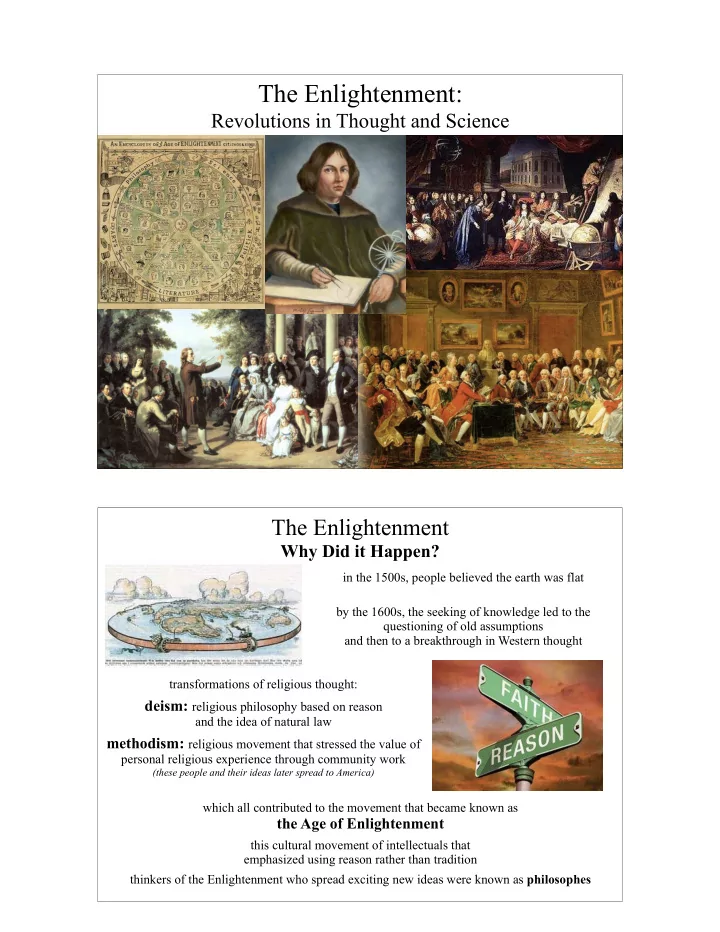

The Enlightenment: Revolutions in Thought and Science The Enlightenment Why Did it Happen? in the 1500s, people believed the earth was flat � � by the 1600s, the seeking of knowledge led to the questioning of old assumptions and then to a breakthrough in Western thought transformations of religious thought: � deism: religious philosophy based on reason and the idea of natural law � methodism: religious movement that stressed the value of personal religious experience through community work (these people and their ideas later spread to America) which all contributed to the movement that became known as the Age of Enlightenment � this cultural movement of intellectuals that emphasized using reason rather than tradition � thinkers of the Enlightenment who spread exciting new ideas were known as philosophes
The Enlightenment: Revolution of Thought natural law a universal moral law that could be understood by applying reason Thomas Hobbes (1588-1679) English political theorist said people form a social contract to live obediently under a ruler, because without a leader people naturally are violent and disorderly Leviathan (1651), showed a world without government in which life was “nasty, brutish, and short” Rene Descartes (1596-1650) French philosopher and mathematician believed truth must be reached through reason invented analytical geometry Discourse on Method (1637): “I think, therefore I am.” Baron de Montesquieu (Charles-Louis de Secondat; 1689-1755) French political theorist who admired English government believed in the separation of powers legislative, executive, and judicial branches contributed to the Encyclopedie and wrote The Spirit of Laws (1748) The Enlightenment: Revolution of Thought Jean-Jacques Rousseau (1712-1778) French philosopher born in Geneva to French Huguenot parents The Social Contract (1762): government should be made by the people Voltaire (Francois-Marie Arouet; 1694-1778) French satirist who was jailed twice for writing about the Church and insulting a nobleman Candide (1759): challenged the idea that everything works out for the best “I disapprove of what you say, but I will defend to the death your right to say it.” Immanuel Kant (1724-1804) German philosopher who claimed that there were two worlds the physical world, which is known through the senses the spiritual world, which is known through faith religion is real even though it can’t be scientifically explained
The Enlightenment: The Scientific Revolution Nicholas Copernicus (1473-1543) started his scientific career in Poland in 1492 said earth was round and that it rotated on its axis as it revolved around the sun kept his ideas secret = couldn’t be persecuted for them Galileo Galilei (1564-1642) mathematician; telescope; discovered moons orbiting Jupiter = not all heavenly bodies revolved around earth; Catholic Church put him on trial; forced to recant Johannes Kepler (1571-1630): astronomer and mathematician; elliptical orbits Francis Bacon (1561-1626) philosopher; scientific method The Enlightenment: The Scientific Revolution Joseph Priestly (1733-1803) English chemist and clergyman discovered oxygen and studied the existence of carbon dioxide Antoine Lavoisier (1743-1794) French scientist who discovered the nature of combustion � Marie Lavoisier, his wife, learned English and Latin so she could translate scientific essays and books for him she also drew the illustrations for his books William Harvey (1578-1657) English doctor who proved Robert Hooke that blood circulates through (1635-1703) the body via the heart and English scientist who veins used the newly invented microscope to find cells in vegetable tissue Andreas Vesalius (1514-1564): medical student; dissections
Enlightened Despots absolutist rulers who governed by Enlightenment principles while keeping their royal powers Frederick II of Prussia (ruled from 1740–1786) abolished the use of torture established elementary schools promoted industry and agriculture Joseph II of Austria (Maria Theresa’s son, ruled with her from 1740– 1780, then alone until 1790) Maria Theresa of Austria abolished serfdom (ruled from 1740–1780) made land taxes equal for nobles and peasants most far-reaching measures of instituted freedom of the press enlightened despotism occurred took property from Catholic Church; under her reign used the money to fund hospitals set up elementary schools granted religious freedom to freed all serfs who worked on Protestants and Jews her estates The Enlightenment Spreads Encyclopedie (1751) 28 volumes containing all the new theories salons banned by Catholic Church for its criticisms of the Church gatherings held in the homes of wealthy patrons held partly as a social gathering and partly to increase the knowledge of the participants through conversation Madam de Pompadour (Jeanne Antoinette Poisson) Louis XV’s mistress from 1745 until her death in 1764) hosted salons and noted for her intelligence and wit
Recommend
More recommend